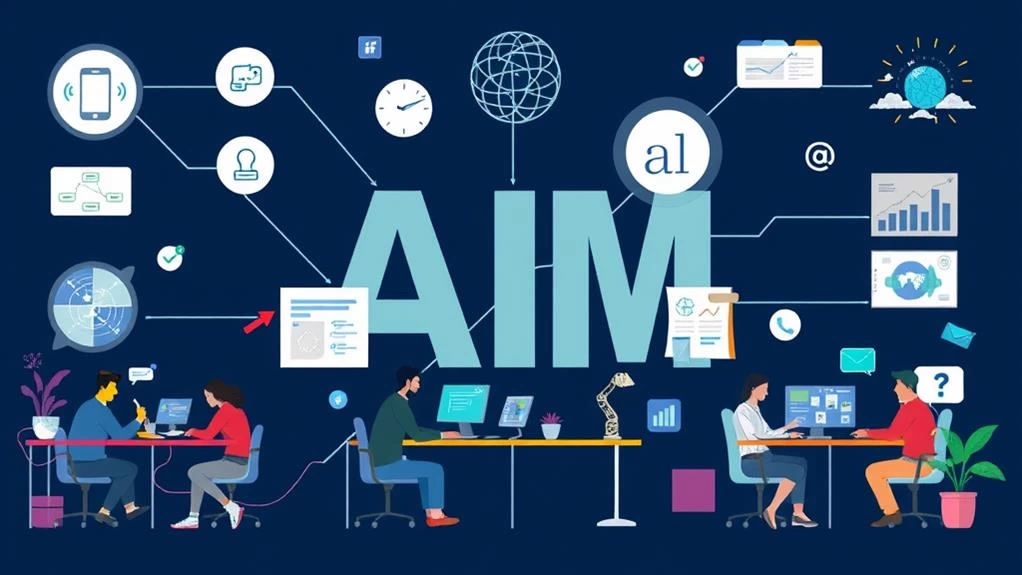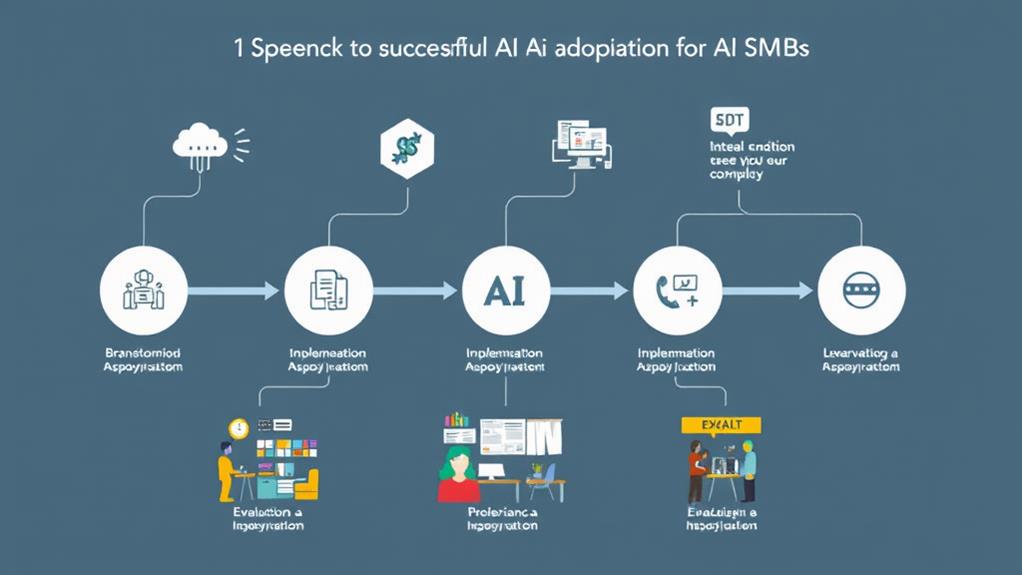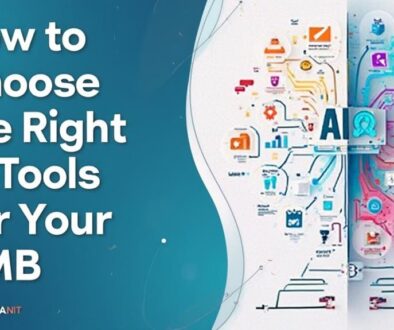AI Implementation: A Game-Changer for SMBs
AI implementation markedly transforms small and medium-sized businesses (SMBs) by streamlining operations, enhancing customer engagement, and enabling data-driven strategic decisions. Technologies such as machine learning and natural language processing allow SMBs to automate repetitive tasks, personalize customer interactions, and extract actionable insights from data. This leads to improved productivity and risk management, as businesses can anticipate market trends and consumer behavior. However, successful integration requires careful planning, employee training, and addressing potential resistance to change. Exploring these aspects can reveal the full potential of AI as a competitive advantage for SMBs.
Key Takeaways
- AI enhances decision-making by leveraging data-driven insights, improving strategic planning for SMBs.
- Automation of repetitive tasks through AI increases productivity and operational efficiency in small to medium-sized businesses.
- Personalized customer interactions and predictive analytics lead to superior customer service experiences powered by AI technology.
- Effective change management and employee training are essential for the successful adoption of AI tools in SMBs.
- AI technologies offer competitive advantages through market trend analysis and tailored marketing strategies for targeted audiences.
Understanding AI Technologies

Artificial intelligence (AI) encompasses a range of technologies designed to simulate human intelligence and enhance decision-making processes. Among these technologies, machine learning (ML) stands out as a critical component, enabling systems to learn from data, identify patterns, and make predictions without explicit programming. This adaptability makes ML particularly valuable for small and medium-sized businesses (SMBs), which often rely on data-driven insights for competitive advantage.
Machine learning algorithms can analyze vast datasets to provide actionable intelligence, facilitating more informed strategic decisions. For instance, an SMB might utilize ML to optimize supply chain management by predicting demand fluctuations or identifying the most cost-effective suppliers. The underlying ability of ML to improve with exposure to new data creates opportunities for ongoing refinement and operational efficiency.
In parallel, natural language processing (NLP) represents another key facet of AI, focusing on the interaction between computers and human language. NLP enables machines to understand, interpret, and generate human language in a valuable way.
For SMBs, effective NLP applications can automate customer service through chatbots, streamline content creation, or analyze customer sentiment within reviews—all enhancing the capability to engage meaningfully with clients.
Therefore, understanding the functionalities and applications of both machine learning and natural language processing empowers SMBs to leverage AI technologies effectively. By adopting these innovative tools, businesses can foster operational resilience and empower their workforce to focus on strategic priorities, thereby enhancing overall productivity and profitability.
Benefits of AI for SMBs
Leveraging AI technologies can yield significant advantages for small and medium-sized businesses (SMBs) across various operational facets. At the forefront, AI enhances customer service by enabling personalized interactions and predictive analytics, allowing businesses to anticipate and respond swiftly to customer needs. This level of responsiveness not only improves client satisfaction but also fosters loyalty, thereby providing a competitive advantage in crowded markets.
In addition to customer engagement, AI facilitates workforce automation, streamlining repetitive tasks that consume valuable human resources. By reallocating employee efforts to more strategic initiatives, SMBs can achieve robust productivity gains. Moreover, the automation of processes contributes to cost reduction, allowing businesses to operate more efficiently and pivot resources towards innovation and growth.
Additionally, AI plays a pivotal role in decision support, providing data-driven insights that can refine strategic planning. These insights allow SMBs to navigate complexities in their supply chain, optimizing logistics and inventory management while minimizing wastage. Effective risk management frameworks powered by AI also enable businesses to forecast and mitigate potential disruptions, securing operational continuity.
Lastly, AI drives product innovation by analyzing market trends and consumer feedback, which informs the development of new offerings tailored to evolving demands. Embracing AI not only bolsters efficiency but also positions SMBs to harness emerging opportunities, thereby guaranteeing sustained relevance in an ever-changing business landscape.
Ultimately, adopting AI technologies equips SMBs with the tools necessary to thrive in a competitive environment.
Steps for Successful AI Adoption

Successful AI adoption requires a methodical approach that considers the unique needs and capabilities of each SMB. The initial step in this process is conducting an AI readiness assessment, which evaluates the current technological infrastructure, existing data management practices, and the organization's overall digital maturity. This assessment not only identifies gaps but also highlights strengths that can be leveraged for AI integration.
Once readiness is established, defining clear objectives becomes vital. SMBs should pinpoint specific areas where AI can bring the most value, whether through enhancing customer service, optimizing operational efficiency, or improving decision-making processes. Establishing measurable KPIs (Key Performance Indicators) at this stage will provide benchmarks for success.
Following this, employee training is essential. Investing in thorough training programs guarantees that staff members understand AI technologies and can effectively utilize them in their daily roles. This might include workshops, assessments, and ongoing support as new tools become integrated into workflows. An informed and engaged workforce will ultimately drive the successful implementation of AI solutions.
Case Studies of AI in SMBs
The potential for transformative growth through AI integration is increasingly evident as small and medium-sized businesses (SMBs) navigate a competitive landscape. Numerous AI success stories illustrate how SMBs are leveraging innovative technologies to enhance operational efficiencies, increase profitability, and improve customer experiences.
For instance, a retail startup utilized AI-driven analytics to optimize inventory management. By implementing machine learning algorithms, this company effectively predicted demand trends, reducing excess stock and minimizing costs. This innovation allowed them to enhance cash flow and ultimately increase profitability, demonstrating the tangible benefits of embracing AI.
Another compelling example comes from an SMB in the hospitality sector. By integrating AI-powered chatbots into their customer service framework, this company streamlined inquiries and booking processes. The chatbot efficiently handled common customer questions, freeing up staff to focus on more complex issues. This not only improved response times but also greatly enhanced customer satisfaction, showcasing how AI can reshape interactions and drive loyalty.
Additionally, a small marketing agency employed AI to analyze consumer behavior and tailor campaigns more effectively. By leveraging predictive analytics, they identified customer preferences, enabling them to craft personalized marketing strategies that yielded a 30% increase in engagement rates.
Through these AI success stories, it becomes evident that SMB innovation is not merely a trend; it is a strategic advantage.
Common Challenges and Solutions

Steering the implementation of AI can present significant challenges for small and medium-sized businesses (SMBs), often stemming from limited resources, expertise, and integration complexities. One of the primary hurdles is the high implementation costs, which can deter SMBs from adopting AI technologies.
To mitigate this, businesses should consider phased implementation strategies that prioritize critical areas, allowing for gradual investment and scaling.
Data privacy poses another critical challenge. SMBs must navigate complex regulatory landscapes to guarantee compliance while maintaining customer trust. Engaging with legal experts during the vendor selection process can help address these concerns.
Employee training is essential for successful user adoption. Many SMBs overlook this, resulting in resistance to new technologies. Extensive training programs should be developed to equip employees with the necessary skills and foster a culture of innovation.
Technology integration presents its own set of challenges, as many existing systems may not readily support AI solutions. This requires a thorough assessment and possibly significant overhaul of current IT infrastructures.
Additionally, change management strategies are crucial to smooth the shift and address potential scalability issues. Leadership must communicate the benefits of AI clearly and involve employees in the process to enhance buy-in.
Future Trends in AI for SMBs
As SMBs increasingly adopt AI technologies, enhanced data analytics will enable more informed decision-making and strategic planning.
Additionally, personalized marketing strategies driven by AI algorithms are set to transform customer engagement, fostering loyalty and revenue growth.
These advancements will also contribute to improved operational efficiency, allowing small and medium enterprises to optimize resource allocation and streamline processes.
Enhanced Data Analytics
Enhanced data analytics represents a transformative shift for small and medium-sized businesses (SMBs), enabling them to harness the power of artificial intelligence to derive actionable insights from vast datasets.
As SMBs increasingly adopt AI technologies, they gain access to sophisticated tools that facilitate predictive modeling, allowing organizations to forecast trends and make informed decisions based on data-driven evidence.
Such capabilities empower SMBs to identify market opportunities and operational inefficiencies, thereby enhancing strategic planning and resource allocation.
Additionally, the integration of data visualization techniques aids in translating complex data into intuitive graphics, making it easier for decision-makers to comprehend insights at a glance.
By employing interactive dashboards and reporting tools, businesses can monitor key performance indicators in real time, thereby enabling proactive measures to be implemented swiftly.
In the context of future trends, SMBs that leverage enhanced data analytics will possess a competitive advantage, as they become adept at interpreting data for strategic gain.
Ultimately, the combination of predictive modeling and data visualization will not only enhance operational effectiveness but will also foster a data-centric culture, empowering SMBs to navigate the complexities of an ever-evolving market landscape.
Personalized Marketing Strategies
Building on the capabilities advanced by enhanced data analytics, personalized marketing strategies are emerging as a vital avenue for small and medium-sized businesses (SMBs) to engage customers more effectively.
By harnessing AI technologies, SMBs can implement sophisticated techniques that cater to the unique preferences of their clientele.
Key elements of an effective personalized marketing strategy include:
- Customer Segmentation: Identifying distinct customer groups based on shared characteristics, allowing for tailored messaging.
- Predictive Analytics: Utilizing historical data to anticipate user behavior and optimize marketing initiatives accordingly.
- Content Personalization: Developing customized content that resonates with the target audience, enhancing user engagement.
- Marketing Automation: Streamlining processes to deliver timely and relevant communications, thereby fostering brand loyalty.
These strategies empower SMBs to leverage targeted advertising, ultimately driving better engagement metrics.
As companies gain insights into user behavior, they can adjust their marketing efforts in real time, ensuring their messages remain relevant and impactful.
The shift toward personalized marketing, underpinned by AI, provides SMBs with an unprecedented opportunity to forge deeper connections with their customers, enhancing both satisfaction and loyalty while maximizing ROI.
Improved Operational Efficiency
With the rapid evolution of artificial intelligence, small and medium-sized businesses (SMBs) stand to benefit notably from improved operational efficiency. AI technologies facilitate workflow automation, which can streamline daily operations and markedly reduce manual, repetitive tasks. By enhancing task management procedures, SMBs can allocate resources more effectively, ensuring that personnel focus on high-value activities rather than administrative burdens.
Furthermore, predictive maintenance enabled by AI allows businesses to anticipate equipment failures and schedule timely interventions, minimizing downtime and fostering consistent productivity. This integration promotes process optimization across various functions, from customer support to supply chain management, enhancing responsiveness and agility.
AI also plays a critical role in employee training, utilizing adaptive learning algorithms to personalize skill development, ultimately cultivating a more competent workforce. The granularity with which AI analyzes data equips SMB leaders with actionable insights, driving informed decision-making that supports growth.
As these technologies continue to mature, their capacity to revolutionize operational frameworks promises a future where SMBs work smarter, not harder, establishing a competitive edge in an increasingly dynamic marketplace.
Embracing these AI-driven advancements will be essential for adaptability and success.
Frequently Asked Questions
How Can SMBS Find Affordable AI Solutions?
Small and medium-sized businesses (SMBs) can explore various avenues to identify affordable AI solutions. Researching cost-effective tools that focus on specific business needs is essential.
Additionally, examining budget-friendly options such as open-source software or cloud-based services can provide scalable AI capabilities without significant capital investment.
Engaging with communities and networks dedicated to SMBs can further reveal insights into affordable technologies, facilitating informed decisions that align with operational goals while maximizing available resources.
What Types of Training Are Needed for Staff Using Ai?
Charting the world of AI tools is akin to commencing a transformative voyage, and staff training is the compass guiding this journey.
Essential training methods should encompass hands-on workshops, continuous learning modules, and ethical considerations for responsible usage.
Staff engagement is paramount to foster a culture of innovation.
Moreover, robust technical support guarantees users can adeptly maneuver challenges, ultimately enhancing organizational efficacy while embracing the power of artificial intelligence responsibly.
Are There Specific Industries Where AI Is More Beneficial?
Certain industries demonstrate heightened benefits from AI applications.
In healthcare analytics, AI enhances patient outcomes through data-driven insights.
Retail automation optimizes inventory management and customer service, increasing operational efficiency.
Manufacturing optimization through AI allows for predictive maintenance and improved supply chain management.
Additionally, financial forecasting leverages AI to analyze trends and manage risks effectively.
These sectors exemplify how AI can transform operations, drive growth, and enhance decision-making capabilities.
How Do You Measure AI Implementation Success in Smbs?
Measuring AI implementation success in small and medium-sized businesses (SMBs) involves analyzing several performance metrics, including productivity improvements, operational efficiency, and cost reduction.
Additionally, user feedback plays an essential role in evaluating the technology's impact on employee satisfaction and customer experience.
What Legal Concerns Should SMBS Consider When Using Ai?
Charting the legal landscape of AI usage is akin to sailing through turbulent waters; understanding the currents is vital.
Small and medium-sized businesses (SMBs) must prioritize data privacy and compliance regulations to avoid legal pitfalls.
Furthermore, intellectual property concerns should be meticulously addressed to safeguard innovations.
Additionally, implementing bias mitigation strategies is essential to ensuring fairness and compliance.
Conclusion
In the constantly changing landscape of small and medium-sized businesses (SMBs), the integration of AI technologies represents a pivotal shift akin to harnessing the power of lightning for illumination. By embracing AI, SMBs access unparalleled efficiencies and innovative capabilities, transforming traditional operational paradigms. Challenges may arise, yet with strategic foresight, these obstacles can be navigated effectively. As AI continues to advance, SMBs stand at the precipice of a technological renaissance, poised to redefine industry standards and enhance competitive advantage.




